5 Simple Steps on How to Start an Online Business
The resources, tips & humbling advice on the path of entrepreneurship

Author: Kari Lorz – Certified Financial Education Instructor
We’ve all been there… “I hate my job!” If you haven’t ever said that, either you’re a liar, or extremely lucky!
Yes, we all love certain moments of our jobs, but we’ve all wished we had more flexibility, be it either in when we work, or to stretch our creative boundaries in what we produce.
Then the comes thought comes to you… “I could do this on my own! I should be my own boss! But how do I start my own business?”
Stick around because this post is going to walk you through exactly that, how to start an online business in five simple steps!
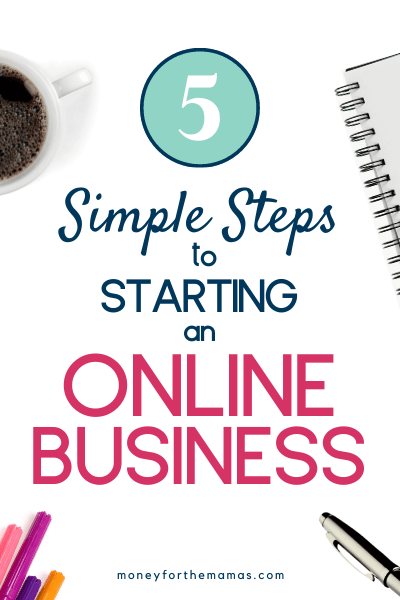
This post may contain affiliate links. If you make a purchase, I may make a commission at no cost to you. Please read my full disclosure for more info
1. What kind of online business should you start?
There are a few options on a type of business…
- Product-based (you want to sell something, aka eCommerce or online store. This can be physical products or a digital product offering).
- Service-based (you want to do something for someone else)
You can be either…
- Brick and mortar store (an actual location with a building)
- Online (work from anywhere and help anyone around the world who wants to buy from you). You can have your own e-commerce business, or sell on established markets like Etsy or Creative Market e-commerce platform.
Figuring these out can take time, and you can change your mind multiple times! Basically, in the beginning, you need to flexible and be fluid about how your business will actually show up. Yet, don’t be flaky and indecisive. There’s a difference.
When I first started, I thought I would be a virtual assistant, helping other entrepreneurs achieve their dreams. Yet after a few clients, I realized that the business model of going out and searching for clients wasn’t for me. As a natural introvert, I don’t really like to reach out and talk to people selling my services.
If you don’t know what kind of small business to start, then do this!
For some of you, you may be stumped as to your own online business idea. This happens, don’t worry, you have some time to figure it out!
One of the easiest (and most profound) ways to start drilling down is to figure out your ikigai! That’s Japanese for your “reason for being.” I talked about identifying your financial why & how to find your ikigai. I feel that both of these steps are essential for finding your calling!
Let’s just do a super quick rundown of what ikigai actually means for us here at this stage, and you can see how it will help you drill down and identify some viable business ideas.
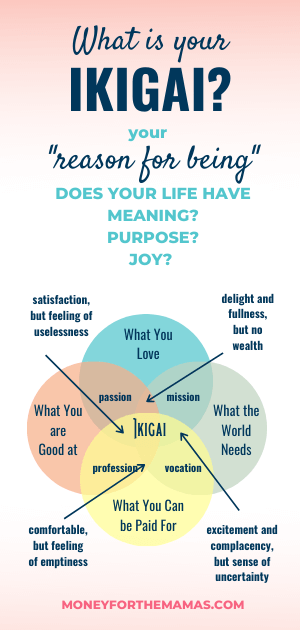
When figuring out your next career move, you need to be practical and look at the earning potential of said career. If it doesn’t bring in a lot of money (and that’s something you absolutely need) then you need to look at other options. Here are some great career choices, and all of them earn over $10k in a month!
2. Starting your small business as an entity
There are a few options for you to choose from, and depending on your business model, you may start with one designation and grow, maybe needing to change into something else.
Let’s go through the very basics of what each entails (there are many more details and intricacies, so research this thoroughly as to what your state requires). The below bullet points are just to give you a general idea of what you’re looking at.
- Sole proprietor: most of us start here, as it’s the simplest business structure. There’s no formal procedure with minimal paperwork, and you can file under your own taxes. Personal and business assets/expenses flow back and forth.
- General partnership: similar to the first type, personal and business assets are fluid, tax is paid at the personal level, yet there is more than one of you. Your assets are divided up by % of ownership.
- Limited liability partnership: this is similar to a general partnership. Yet, this business has filed paperwork with the state, and you are not legally responsible for “negligence, omissions, malpractice, wrongful acts or misconduct” of the other partners.
- Limited liability company: it offers liability protection similar to a large corporation, yet it provides tax options similar to a partnership. It has more flexibility than a corporation and easier to operate. Business assets are separate from personal.
- S corporation: it is operated like a c corporation but taxed like a partnership. There are strict rules and limitations to having and running an S corp.
- C corporation: this is what we generally picture as a “traditional business structure.” There is a clear line of distinction between personal and business assets and has limited liability for shareholders. This comes with increased expenses, more rules, and more hands in the cookie jar.
So what do you choose? You should probably talk to a professional, but if you’re just starting, and it’s only you starting this business, you can probably start as a sole proprietor.
You also need to check with your county and the city you live in, as they may have requirements for when you need to file with them (say if you make over $500 you need to file as a business with your city).
3. Things you need to start an online business
Let’s talk more about nuts & bolts. As in, what do you actually “need” when starting a business? The first step is figuring out your startup cost. You don’t need a lot, but you do need some, say a couple of hundred.
Let’s assume that you want to start as a blogger/freelancer (as you’re great at logo design and branding). You will need a website (to showcase your portfolio) and an email address to connect with clients. That means…
Domain name:
(basically the URL that people type to reach your site). This is a minor investment, and I got my domain for under $20. But you will need to renew annually. Check out NameCheap or GoDaddy. I’m sure there are more places as well.
A website theme:
(this is how your website looks & flows) There are free and paid versions, and everyone agrees that you should make a one-time investment to buy a theme. The functionality is so much more flexible, and since it’s a paid product, the creator will most likely be making updates to it to keep it running smoothly.
I bought my theme from Bluchic, and it’s beautiful! I also love supporting small business owners (it’s a husband & wife team)! Now, you may be tempted to go all out with a website builder to make a custom eCommerce site, but don’t! You won’t need this for a few years, and the expense is considerable, and your knowledge of how to work it is very limited.
Web hosting:
(this is making your website live & active online) This is where the experts disagree, there are lots of good places (a few bad ones too), and many program levels in each. Your choice on a web host depends on how much content (and how often) you’ll be putting on your site, and how fast you want your website to load.
I have hosting through Siteground and have had nothing but great experiences with their product and am super impressed with their level of customer service! I am non-techy by nature, so I have used their online support quite a bit and have been impressed with each and every person that helped me!
Payment Gateway:
I am assuming you want to be paid, right? That means you need a way for people to give you money online. If you’re strapped for cash you can use PayPal for now. They take 2.9% as a fee, which is fairly standard.
How to open up a PayPal account:
If you don’t already have a PayPal account then no worries, you can easily sign up right now and immediately connect it to your game apps so you can start depositing real money today. Here’s how you open an account:
- Go to the Sign Up page.
- Choose the account type you want (personal or business, most likely you’ll choose a personal PayPal account) and click Sign Up Now.
- Enter your information, including your email address, and next choose a password (it must contain at least eight characters and is case sensitive). You will need these to log in to your PayPal account.
- Click Next.
- Click Agree and Create Account.
Email service provider:
You need a way to communicate with potential clients, so you need this service. Trust me; you don’t want to use a Gmail account if you want your business to seem professional or be taken seriously. I’m sorry, it’s true, we’re judgers by nature, and an email of [email protected] just won’t cut it.
The good news is that you can use the free program levels of a few providers. I use Mailerlite (free up to 1000 subscribers) and am happy here again with their product, their training videos & documents, and their customer support! Later on, as my business grows, I’ll need to upgrade. Other providers are Mailchimp, ConvertKit, ActiveCampaign, and more!
Website legal pages:
One investment that you may be tempted to use a free version is with your legal pages. DON’T! As a new business owner, you don’t want to end up in court over something and find out that you’re not protected at all, and now subject to a fat fine, or being sued. If there’s one place you need to invest in, this is it due to the potential significance and level of ramifications.
You will need a Privacy Policy, Website Terms & Conditions, GDPR, and California Privacy Rights documents. Your website will also need a cookie disclaimer and affiliate disclosure (these last two are free but are a must-have).
I purchase all my legal documents from The Contract Shop, an extremely reputable business that caters specifically to the online community! They have tons of different types of legal pages and contract templates (all dependant on what you do).
A good general rule for everything you buy relating to a website is don’t buy the bottom of the barrel program/services. Yet, you don’t need the top tier everything; it’s too expensive, and your site being small, you won’t see the benefits of the upgraded product. So that leaves the middle of the road, which is a good place to be when you’re a new small business owner.
State & county license:
Each county and state is a little bit different, but you will need some form or a business license. Just Google your state and they will guide you on what kind of business license you will need.
4. Business planning & day to day running of your home based business
Now, this is the fun part, the actual planning of your day-to-day stuff! You don’t need to have all the answers now, but you need to be aware that these pieces exist and that at some point, you’ll need to devote time & attention to them. Don’t worry, your business plan isn’t set in stone, you can change it as you grow and shift, but the basic components are…
A monetization strategy:
This is how you will make money, what are you selling? A product, a service, a focus on affiliate marketing (promoting other people’s goods for a % of the sale), advertising revenue, a social media influencer, etc. What all the experts agree on is that you need to diversify your income streams. Don’t put all your hopes into one single way of making money.
It takes a long time to establish a website (2 years minimum), so maybe you need to focus on earning money in a way that’s not your first choice. Like being a virtual assistant doing social media management while your blog is in its infancy.
Here are some great ways that moms are working at home, and totally keeping it in balance (most of the time) with their home life!
A marketing campaign & strategy:
This one can be confusing for those starting out, as it can be as simple as you want or as complicated as you want. Keep in mind this will evolve quite a bit over time. It will take you time to learn platforms, it’s impossible (yes impossible) to do it all, and do it well from the beginning (unless your previous 9-5 job was very similar).
Start where your ideal customer is at (Pinterest, Facebook, Instagram, twitter, email marketing, networking, etc.), and then add on another platform as you master the first.
An operating plan:
This is the loosest of all the strategies. This is how you will do your day to day work. Will you work on your business on Tuesdays, Fridays & Sunday afternoons? Or will you work 10 hours a week, two hours a night after the kiddos go down? Will you still work 9-5 for awhile while you get your business more established? Or will you go down to part-time, or quit your job outright?
It sounds like a lot, and honestly, it is. Anyone who says it’s easy, or super fast is lying, and they have an ulterior motive behind their sweet talk! The good news is that there are lots of great resources out there for you!
A learning plan:
I am sorry to tell you this, but you don’t even know what you don’t know! Does that make sense? There is SO MUCH to learn about the online world it is dizzying! To add to this, just for fun, everyone usually has different opinions about things. What is the best product/procedure/social media/everything! Who are you to believe?
Luckily there are some fantastic people with hearts of true teachers! You just need to find the person who teaches the way you learn best, and who are in a similar niche as you. (A niche is a specific area with which you will be working in or catering to.) For example, you could be in the mom blog, or lifestyle blog, or DIY crafter, or gardening, or cooking & recipe niche.
There are so many different niches and so many different levels. You could be a coach, a blogger, or an online course creator, and so on and on! If you are a mom blogger (or your target audience is Moms), you cannot go wrong with Suzi Whitford from Start a Mom Blog!
Honestly, she is kind, patient, funny, encouraging, smart, and thorough! Everything you could ever want or need in a blog guru! Here are her signature courses so you can see all of her specialties. Any of them would be a worthy investment!
She also has a free blog plan, that over 40,000 people have taken! So don’t miss out on this chance to learn from one of the industry’s best!
YET, I do realize that we cannot all invest in learning like we want to! Especially after buying everything for your website! She has a great FREE course to get you started on your journey, this goes over the basics, there’s an option to opt-in to this free course at the very bottom of her page! You won’t be disappointed! She has helped over 100,000 people through her courses (yes, that’s the number of students she’s enrolled), and her students sing her praises!
Learning resources
Yes, there are a lot of free trainings, printables, eCourses, and such that you can sign up for and learn from. I did it this way, bootstrapping they call it. Please, please, oh please don’t do this. I wasted so much time, effort, mental bandwidth, and not to mention printer ink learning this way!
There are sooooooooo many who claim to be teachers, experts, and such, and some of them may indeed be. Yet, they may just have a way with words and make big claims. There is no independent third-party regulator to be sure that people are telling the truth.
Other excellent reasons are that…Their info may be outdated. Established and professional bloggers update their free materials to keep them current, smaller bloggers usually don’t have the capacity to stay on top of things like this.
Their info may be specific and or successful to only a particular group of people or types of niches.
Their success could be due to a viral reason. Long-standing and ongoing success is much harder to come by. Anyone can go viral, it doesn’t make them amazing overall, nor their teachings gospel.
You will need to find a lot of different gurus to get the full picture. Only a handful of established bloggers can teach a wide variety of topics that you’ll need to know about. This means you’ll wade through a lot of different opt-ins flooding your inbox, and they teach in different ways, which makes it harder for you to pivot from one topic to the next.
- Tracie Fobes is a fantastic teacher, who wants nothing more than for you to achieve your big dreams! She has so much experience in the online world, I can confidently say that you would be making a mistake if you didn’t check out her offerings!
I mentioned above that I’m not a fan of free resources, but Tracie’s Profitable Blogging Roadmap is the exception! Yes, it’s free, but as a true professional in this business, she updates it, and makes sure that it’s packed with value! A good thing about this is that if you like Tracie’s teaching style (there are lots of ways people teach, and you won’t love everyone’s style) then she has lots of resources for you to continue your learning!
Yes, there are some smaller online business owners that are considered experts in their field. No, they don’t teach you everything, as the previous bullet said was ideal. But for their particular topic, they need to be focused, detailed, and entrenched in that topic. For example, if you had heart problems, you want to go to a cardiologist, not a general practitioner. Three examples of this are… - Debbie Gartner with SEO for your website. Learning SEO is one of the best investments you can make with your blog, and Debbie’s bundle of her two eBooks is your best bet in the industry! Bundle: Easy On-Page SEO + Easy Backlinks for SEO
- Monica Frose with expertise on creating digital products.
- Kate Doster for her crazy successful email marketing juju!
These women don’t need to be experts in everything; they are badasses in their field (and everyone knows it)!
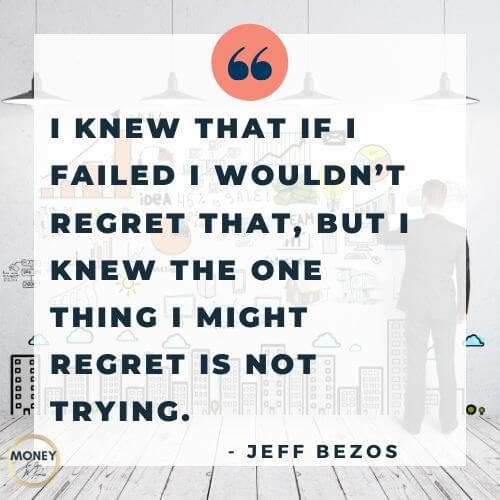
Who should put on the entrepreneurial cape?
I’ll tell it to you straight; this path isn’t for everyone. Even though I thought it was for me, there were many times where I was overwhelmed, tired, frustrated, lacked confidence, funds, and knowledge to the point where I thought, “I should never have started this! This is too bleep bleeping hard!”
I’m sorry to tell you this, but even the most fantastic business owners have this thought every now and then. Now I’m not saying that I am a fantastic business owner; what I am saying is that everyone feels this way at some (or multiple) points.
If you’re not scared off, then let’s go deeper. Starting your own online business is for you if you have a burning passion for something, and you want to share it with others. Or if you have a fantastic new product, or if you’re going to do something in a completely different way than anyone else.
Starting your own online business isn’t for you if you just simply don’t like your job. You need a much stronger reason than this to get through all the challenges you will face!
Female entrepreneurs are on the rise!
The good news is that female entrepreneurs are killing it these days! I did a great piece where I interviewed some aspiring boss moms and some very well respected women (in the online industry) and asked them about their money goals. It was a sneak peek behind the curtain of their business, and it was truly inspirational!
I also included some impressive stats and on women-owned businesses! Here’s a short highlight of those numbers…
- The US has 12.3 million women-owned businesses.
- US women-owned businesses generate $1.8 trillion a year. Lots of women make 6 figures on their business!
- 40% of US businesses are women-owned.
- Women started 1,821 net new businesses every day in 2018.
To see more numbers and get some guaranteed inspiration, check out Smart Money Goals from Mamas Making it Happen!
Be sure to check out this piece on How to Become a Pinterest Virtual Assistant & Manager. Abbey Ashley started a VA business, and in a few short years, she brought home $652,000!
Characteristics of a good entreprenuer
You need to be determined and have a passion for what you do! Other entrepreneur skills include resilience, daring, resourceful, a problem solver, optimistic, being a good planner, and bonus points if you have a knack for inspiring others!
- Sign up with ibotta and get $10 sign up cash as a new customer!
- Earn points on ANY receipt from ANY store and redeem for gift cards with the fetch rewards app.
- Sign up with Inbox Dollars and get paid to read emails, watch videos, and take surveys. Easy peasy!
- Get free gift cards & cash for the everyday things you do online at Swagbucks. Use the link and get a $5 bonus
- Save money on gas by signing up with Upside; it gives you up to $.25 cents cash back per gallon! Use the code AFF25 when you sign up; you’ll get a $.25 cents per gallon bonus!
- Sign up with Cash App and get a $5 bonus when you use code “NRTZMHV.” You have to complete the sign up requirements to get the bonus! Read how to do this here with point #1.
If you want to still start an online business but are intimidated by building it yourself, then maybe consider opening an Etsy shop to sell your items? Remember you can both physical and digital goods on Etsy! Be sure to read our guide for how to get sales on Etsy from the very start!
At the end of the day
Starting your own online business is hard work. Don’t believe anyone who says it’s easy or fast! Yet there are things that you can do strategically to set yourself up for success! Always keep your reason for starting your business close to your heart and in the front of your mind! It is hard, but if you do it right, it will absolutely be worth it!
Starting your own online business provides more freedom for your family, which is essential for Moms with kids! More importantly, it gives you the freedom to follow your passion and to make your life meaningful!
And isn’t that what really living your life should be about?
I think so! That’s why I’m here, writing these words to you. So thank you, thank you for letting me help you, teach you and guide you through the crazy amazing journey of starting your own business!
Related Articles on how to start an online business:
- Smart Money Goals from Mamas Making it Happen
- Finding Your Financial Why & How to Find Your Ikigai
- 9 Creative Ways to Make Money
- What is 6 Figures, and Can I Even Get by on a 6 Figure Salary?
- What to Sell on Etsy – 25 Shop Ideas to Make Your Mark!
- How to Start Your Own Pinterest Management Business

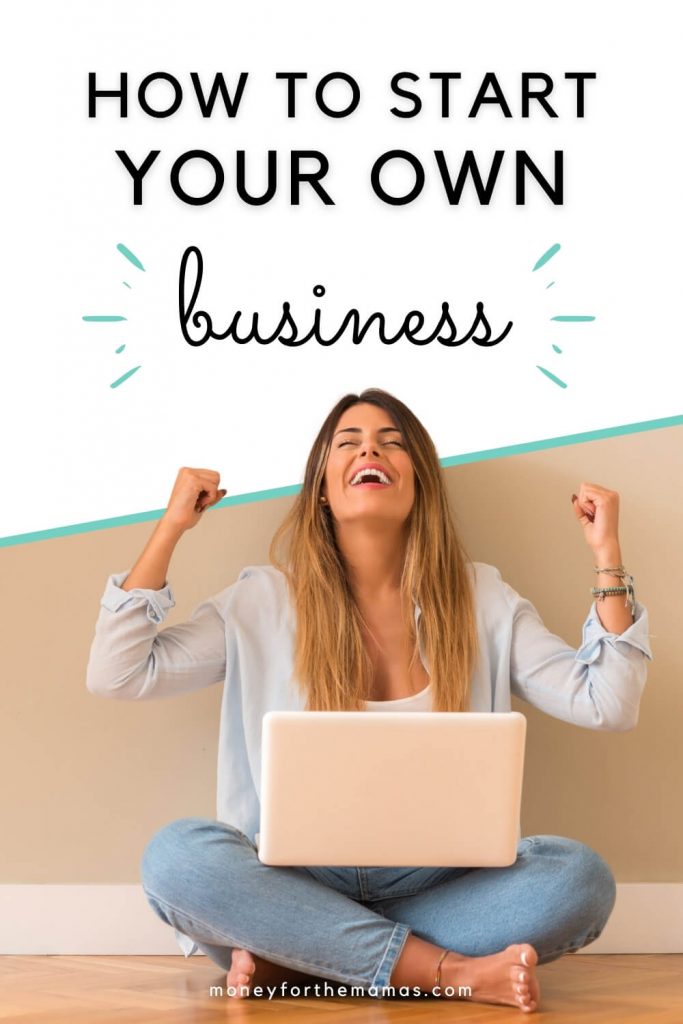
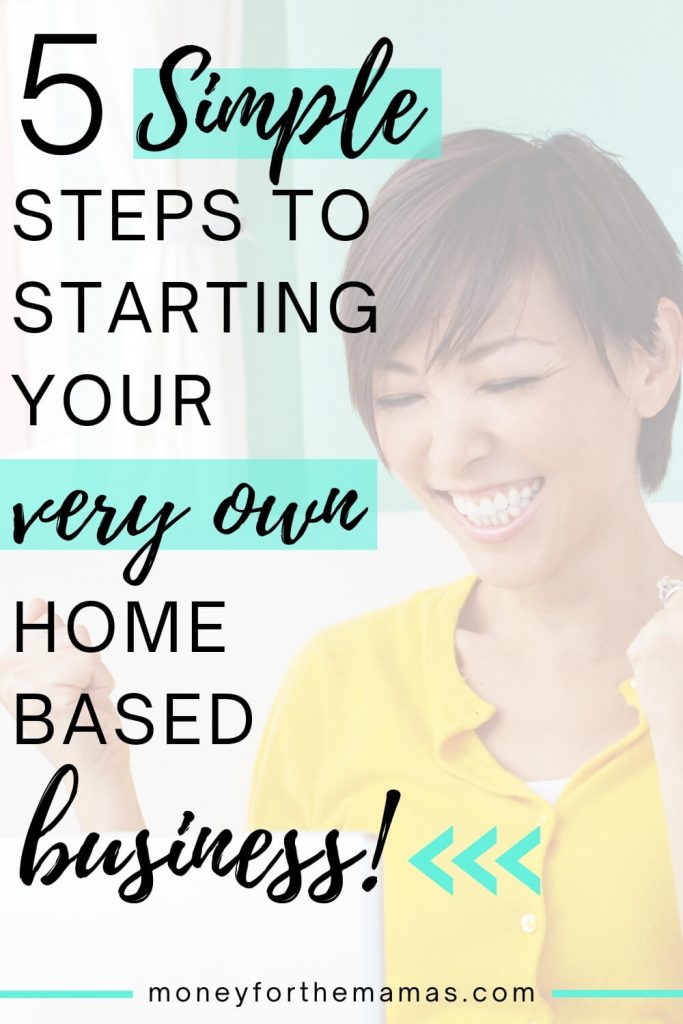
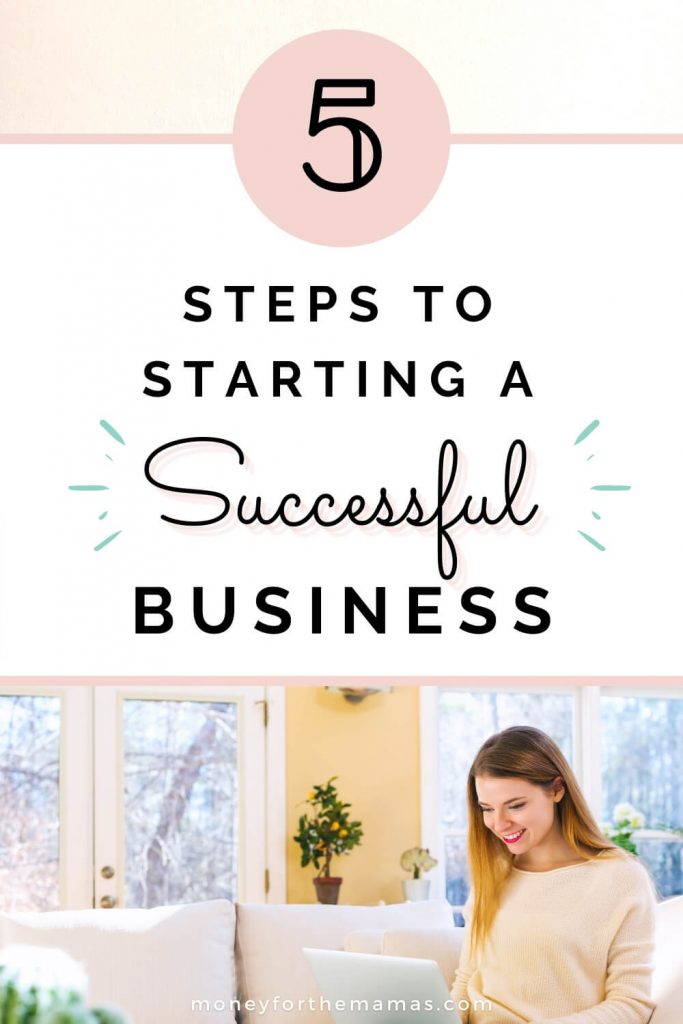
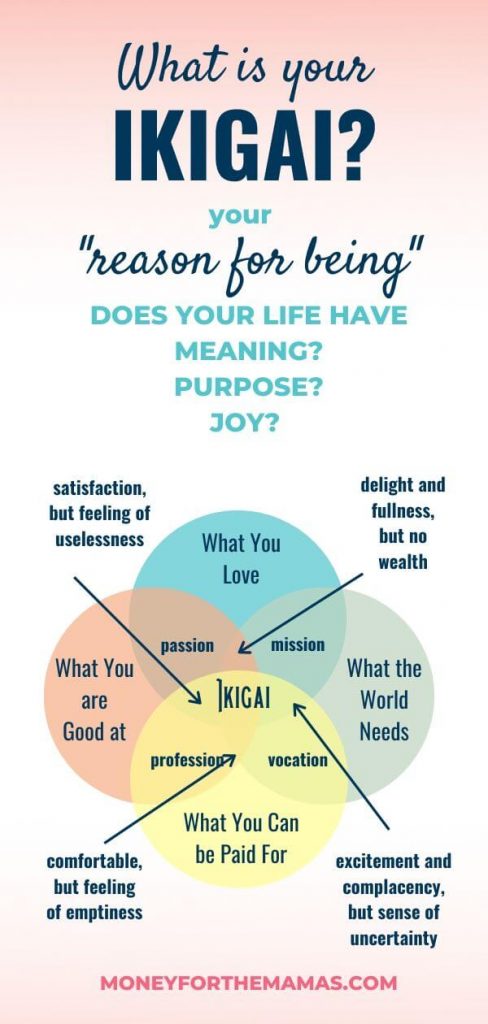
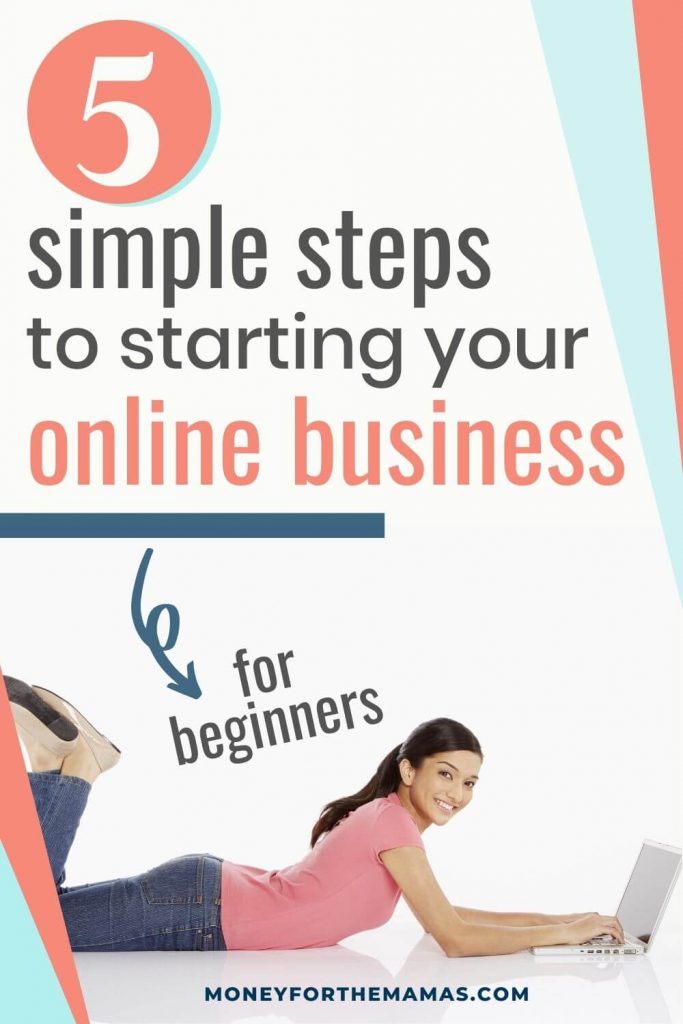
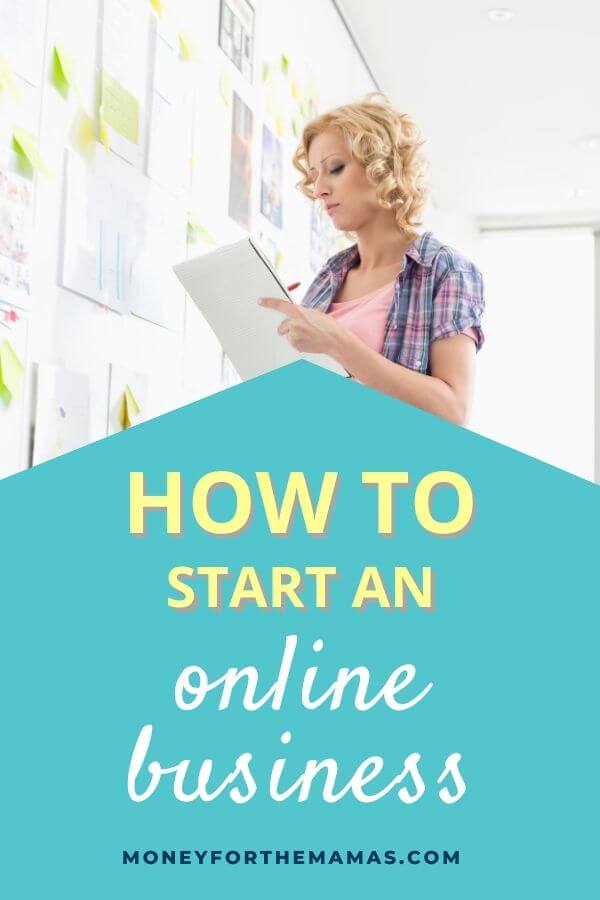
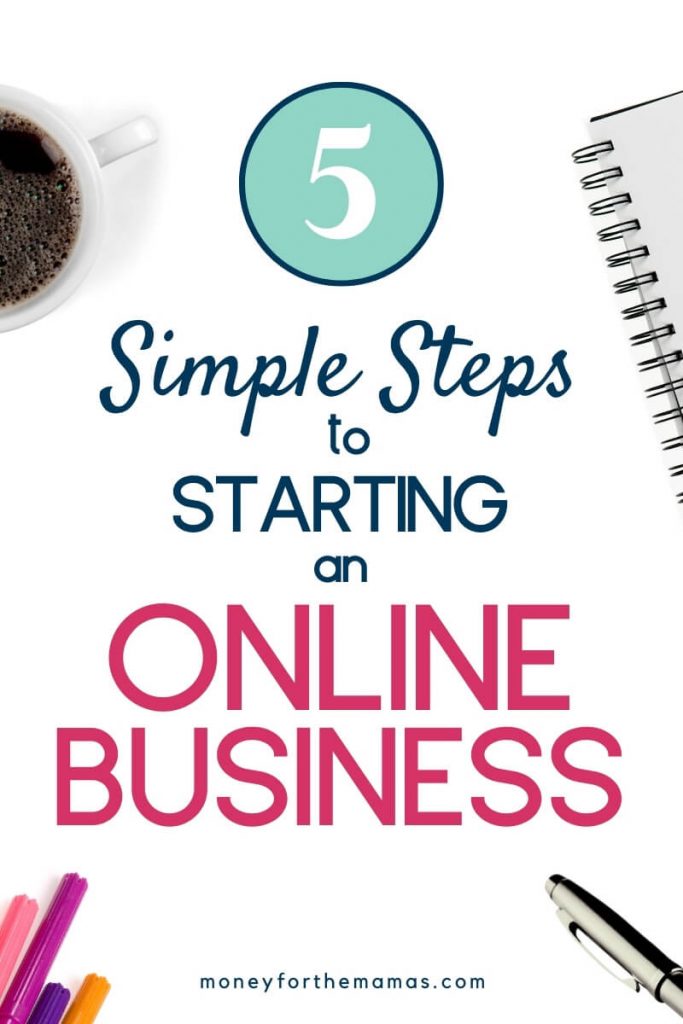

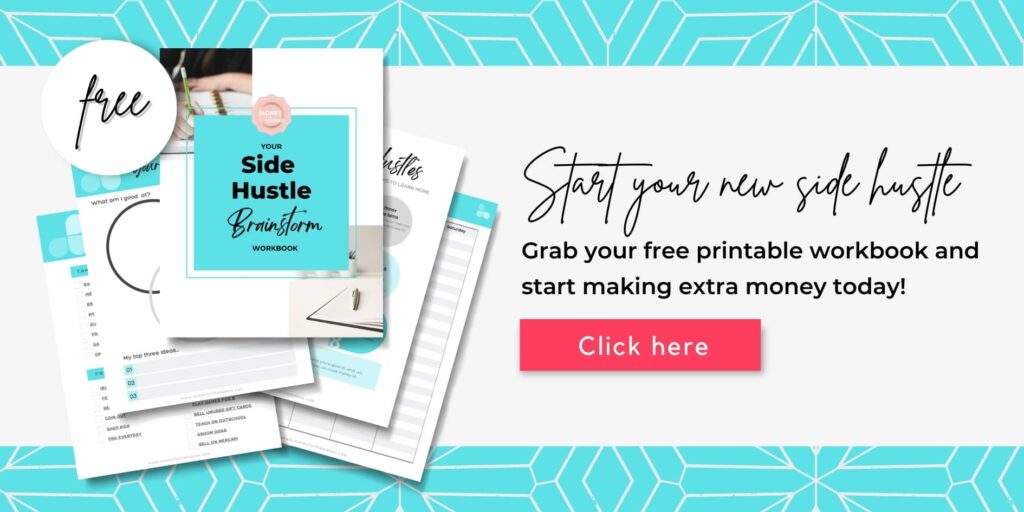
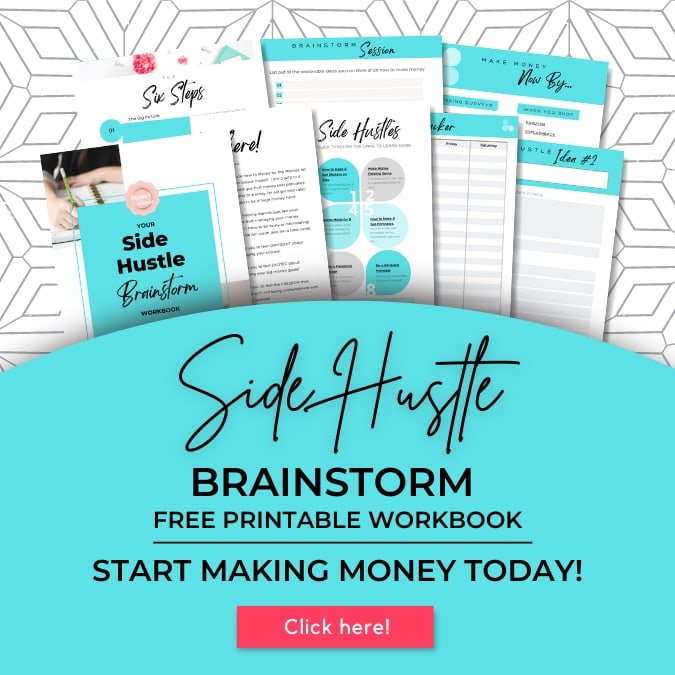
This is a great resource! I will be bookmarking it for sure!
So glad you liked it!
Love this! It’s very detailed and will help me as I refined my business brand and goals. Thanks for writing this 🙂
You’re very welcome Crystal!
I am trying to make my blog run more like a business. It’s been a struggle as it’s a side hustle for me at this point. Thank you for the great info!
Having a full time job and blogging can be rough for sure! Keep at it and things will get easier, I promise!
Very informative list. And I agree to the point that passion is very important when you are starting any business. Thank you for these practical suggestions.
Yes, passion plays a huge role in the success of a business!
These are some awesome tips and I love how you broke everything down! Definitely helpful to anyone looking to starting their own business!
Great blog post. I’m going to share this with my sister as she’s planning to start an online business very soon.
You are so correct, Kari that bootstrapping things are time-consuming and on top of that it’s exhausting. Plus, it’s not as comprehensive because you’re not learning everything in a structured manner. And, you don’t know everything you might be missing. I agree if you can work it into your budget that a good course would be a better route unless you’re in no rush to see results.
That’s hilarious… “unless you’re in no rush to see results”! I love it 🙂
I love the idea of using your ikigai to kick start an online business idea! Great advice!
So glad you liked it, once I heard about Ikigai, I knew it was the missing link for so many, and it just makes total sense!
This is such a huge list of options to become and enterpreneur. Extremely helpful for fulltime moms like me
So glad you found it helpful!
Hi there Kari
thanks so much for sharing, like many out here, I`ve wanted to start an online business but always felt unsure, who will want to read my blog or to put it honestly, how do I really start the business in the first place.
But reading your post,many things are clearer now and I can`t wait to get started, really appreciate you sharing this, very helpful and things explained in an easy to understand way.
Getting started is absolutely the hardest step! All you need is a nudge and a clear path!
Some great advice for all of us venturing on this path of self employment and running a business 🙂 thanks for sharing!
You’re very welcome Sara! Thanks for stopping by!
This is super informative. There are so many great tips. Will be pinning for future reference.
So glad you found it helpful!
Thanks so much! Your outline on starting a business was comprehensive without being complicated.
Thank you for stopping by! I always tend to overthink things and make them a lot harder than they need to be, so sometimes you just need to strip away all the fluff!
I could not agree more about the quality of free courses! I tried to learn from many different “experts” and found that I learned more in less time from the paid courses. I wish I’d found Suzi’s course when I started my blog, so I hope this post helps another aspiring online entrepreneur save some time.
Suzi is amazing right! I too wish I would have found her content a lot sooner!
Wow! these tips are so good. Never even heard about ikigai. lol thank you!
You’re welcome Tiffany!
Great writing tips! I’m using this time to write and these out of the box suggestions will definitely help me put some words on the screen!
So glad you found it helpful!
Hey.do you mind talking about the business model canvas? Thanks
The canvas business model sounds great for someone who has previous experience and knows what they want to do. I can see the benefits of canvas to helping make things a lot clearer and focused. Yet for many starting in the online world, they don’t even know what they don’t know (if that makes sense). There is a steep learning curve, which can be made more manageable with quality information and a caring teacher!
It is definitely an overwhelming task thinking about starting a business but I love that you broke it down into digestible and manageable steps. I especially love all the resources you’ve listed to help along the way! Great for newbies like me who have zero background and don’t know where to start!
There are so many quality resources (as well as outdated ones) and it’s hard to know which is which when you’re new!
Great post. I love how you break this down and place emphasis on making sure you are aligned with your business! So important in preventing burnout.
So glad you liked it Kinzy, thanks for stopping by!
Thank you for this! Im actually in the process of starting my own business. Great tips
Best of luck to you with your new business!